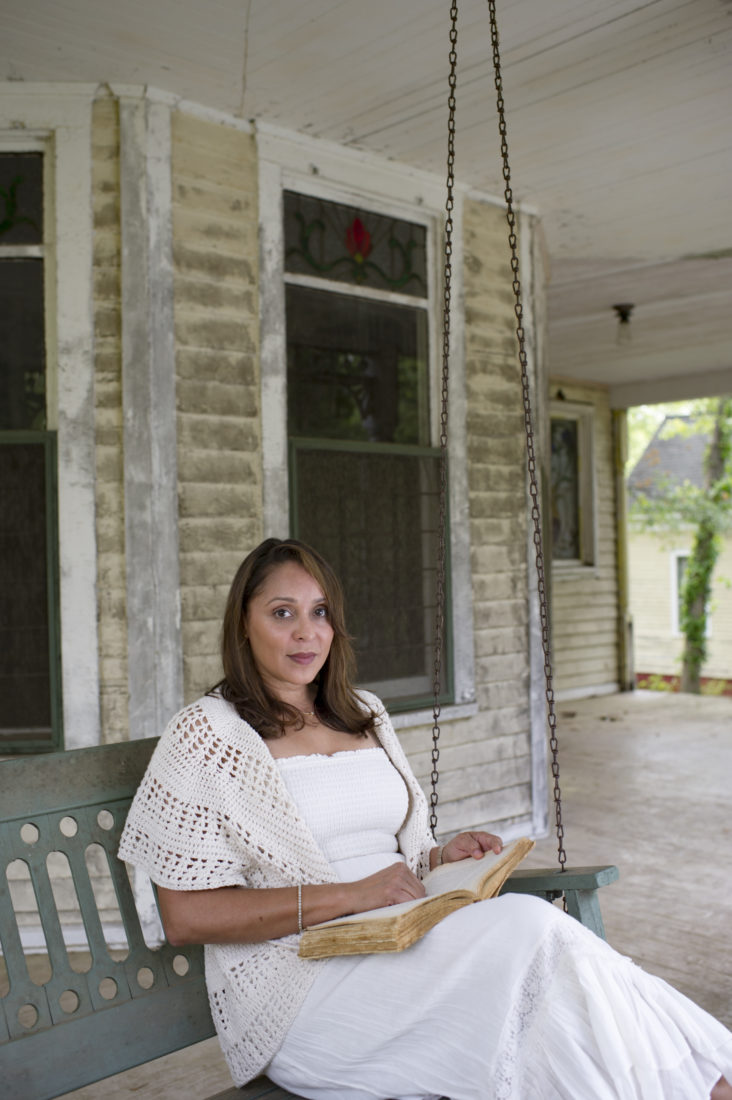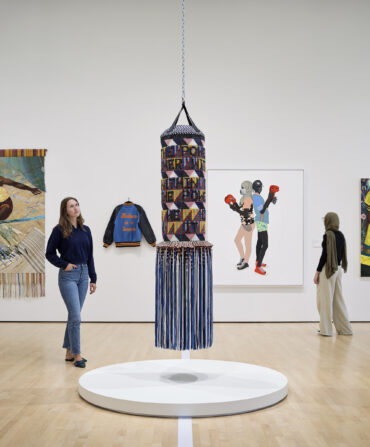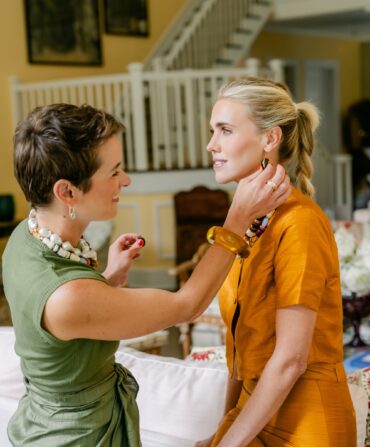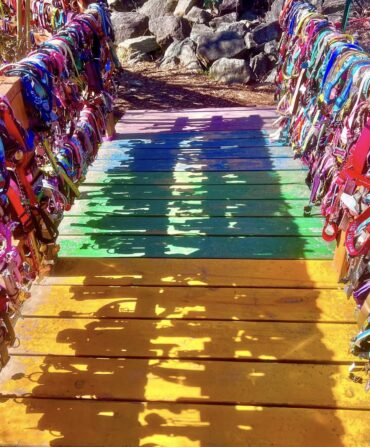Editor’s note: The following originally appeared in the G&G book Southern Women: More than 100 Stories of Innovators, Artists, and Icons. The book features interviews with, odes to, and essays by musicians, actors, artists, designers, entrepreneurs, authors, chefs, public servants, and more who have roots in the region.
When Natasha Trethewey first eyed her Evanston, Illinois, house, with its two big verandas, neoclassical columns, and a fleur-de-lis window in the center, she thought of her childhood in New Orleans. “This is where I was meant to be,” Trethewey says of the home, which she and her husband moved into when she joined the English department at Northwestern University in 2017 after fifteen years teaching at Emory University, in Atlanta. “I felt like I brought my ancestors with me.” Since her 2000 debut, Domestic Work, the Mississippi-born Trethewey has written five additional collections of poetry, including 2006’s Native Guard, for which she earned the Pulitzer Prize. Along the way, she’s secured just about every fellowship and honor to be had—including two terms as the nineteenth poet laureate of the United States.
In 2017, your Illinois house burned—you used the word displaced to describe how you felt, a word attached to those who lost their homes in Hurricane Katrina, which you wrote about in a 2010 nonfiction work.
We were displaced, though we are certainly comfortable in ways people who are struggling through natural disasters are not. It did make me think a lot about the role personal geographies play in our lives. When I wrote the poem “Theories of Time and Space,” I was thinking about the places we have been at some point in our lives that are familiar with places we’ve grown up. In particular, when we move away from them and go back to them for the first time, they seem so transformed, yet even if they haven’t, they seem that way because we are the ones who have changed.
The funny thing about that poem is even though I was thinking figuratively about how we change, I turned the book [Native Guard] in to my publisher in March 2005, and by the time the book came out, that poem had become literal because Hurricane Katrina just devastated my hometown. And did change Mississippi in ways that I could not have imagined.
You’ve dealt with other tragedies, too—how did writing help you cope with your mother’s death after your stepfather murdered her in 1985?
I firmly believe that in order to survive a trauma, you have to be able to tell a story about it. The biggest story I tell about devastation is the story of my mother’s death. My becoming a writer in the aftermath of that [helped me] to contend with the deepest wound that I have. It gives it meaning, in the meaningfulness and purpose of my own life. Otherwise, it’s just senseless, and how could I live with that if there wasn’t something meaningful to be made of it?
And so, in telling the stories, in the narrative, in what I try to do in my own work, is an act of not only survival, but I would go so far as to say an act of thriving. I’ve not merely survived my mother’s death; I would argue that in spite of it, because of it, I thrived.
How did you get to that point?
Right after her death, I tried to write a poem about it, but I wasn’t writing poetry at that point. The decision to write a poem when I was nineteen was more about what we often think poetry offers us that other forms of expression may not. I turn to poetry in the way Lisel Mueller talks about in her poem “When I Am Asked.” At the end of the poem she says, “I . . . placed my grief / in the mouth of language, / the only thing that would grieve with me.” When I sat down to write my poem about the day my mother died, I was thinking about how maybe poetry seems like the only kind of sacred heightened language that might grieve with us.
Your poem “Pilgrimage” features the line “I can see her / listening to shells explode, writing herself.” That feels like a nod to your mom.
That’s absolutely right. I think for a lot of readers, or a lot of people who hear my story, they often land on the easiest interpretation of how I’ve come to be a writer.
I’m a daughter of a writer—my father was a poet—and therefore I am a poet. But that’s actually not quite right. Yes, I’ve had a poet in my family, but I’m not a poet solely because of my father. I think the primary reason I’m a poet is because of my mother. I think other people miss her role in my life, and how important she is to why and how I do what I do.
Your father pushed you to be a writer because he knew you had something important to say.
I think my father was very aware of what it meant for me to be both Black and biracial in the Deep South at that particular time. That it meant I would have a different and necessary perspective on the world, on the place that I was growing up, and on the history of not just that place, but the United States. We are seeing the rise of more visible forms of white supremacy; I’ve always been concerned with these kinds of deeply ingrained and unexamined notions of racial difference that are the bedrock of white supremacy that even “good white people” carry inside them. And the way that it was often manifested in my childhood was people saying to me if I did anything well, “Oh, that’s your white side.”
Who were those people?
White people would say that. Or they would say, “Well, you aren’t like the rest of them.” And I would say, “Who’s the rest of them? My mother? My grandmother?” It was as if they were trying to say that the fact that I had white blood somehow made me better, made me distinguished from the rest of my people, and that made me so angry. I wanted to always be seen as exactly like my people, representative of the myriad varieties of my people. Not somehow special or extraordinary, because if I’m special and extraordinary, then it diminishes everyone else. It diminishes my mother and her humanity and my grandmother and everyone else in that community that I came up through.
Who were you thinking about when you wrote the poem “Domestic Work, 1937”?
That poem was about my grandmother. She worked as a domestic in Mississippi in the thirties. She told me about the different jobs she held in her life. But I also saw her as the woman in the poem cleaning her own house. There was something so wonderful about the difference of the work she had to do outside the home, but that she still could take such pleasure in the care of her own home and her own family.
In your poem “Articulation,” you describe a painting of Saint Gertrude, and the piece also seems to become a tribute to your mother.
[Saint Gertrude’s] calling was to be a religious writer. She had a vision of the sacred heart of Christ, and that’s what called her to devotion, and to devote her life to writing religious text. Obviously, I’m making a connection to her, her call to devotion, and to the kinds of writing that I do. The poem ends, “How could I not, bathed in the light / of her wound, find my calling there?” My calling is to answer my mother’s life with mine. That is my highest devotion. Christ gave his life for us, and the faithful are supposed to be devoted. That’s how I feel about my mother.
In addition to being a poet, you are stylish. In 2015, while you were doing a reading at the Museum of Modern Art, your Christian Louboutin heels stood out.
I love that, because I feel like we ought to be many things and that they shouldn’t necessarily fit into some mold that people expect. Before I went off to graduate school, my stepmother told me to get rid of my accent. She thought if you have a Southern accent and were a cheerleader, people were going to think you were stupid. So for years, I never told people that I was a cheerleader. I finally began to say it. I liked being able to put the fact that I was head cheerleader at the University of Georgia next to Pulitzer Prize winner. How many times do you have that? And I’m going to wear some red-soled shoes, too!








